-
KEN LOACH: I, DANIEL BLAKE (2016)
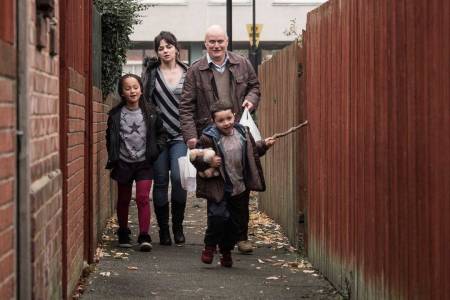
Bureaucracy grinds down
Ken Loach's Cannes Golden Palm winner I, Daniel Blake packs a powerful emotional punch using a neorealist method close to De Sica. Loach's films have become more doctrinaire since he's taken on Paul Laverty as his writer. Their theme is, that in an increasingly money-based, conservative world, as Peter Bradshaw put it in his Cannes Guardian review, "the [British] benefits system has been repurposed as the 21st-century workhouse in our age of austerity: made deliberately grim, to deter or design out all but the most deserving poor." And Loach and Laverty are pretty fucking angry about this. It's not subtle material. But with this kind of economical and plangent filmmaking, you have to be hard-hearted to resist.
Daniel Blake, the everyman exemplar, is a 59-year-old carpenter - played by the disarmingly good and honest looking standup comic Dave Johns - struggling to get public assistance while the state welfare bureaucracy's minions toy with him and ignore who he is. He has had a major heart attack and is on doctor's orders not to work for some months at the craft he has practiced all his life. Some social services "decision maker" misreads a supernumerary questionnaire he oughtn't to have undergone. Or maybe she is getting revenge on him for showing her stupidity angered him. (The first governmental voice, in the opening credits, we never even see.) His status is reversed. He's declared qualified to work, apparently because he can touch his opposite shoulder and put on a hat. Disability payments are denied. He must reapply, and in the meantime to receive funds must inappropriately seek unemployment benefits. For them, he's supposed to spend 35 hours a week seeking jobs he can't take, and prove he has done it. Already it's a Sisyphean Catch-22 situation, and it goes on and on.
Besides this Dan is old-fashioned and computer illiterate and the new system requires many procedures to be performed online. The Internet is not a benefit; it only helps the deliverers of inhumanity to complicate things for decent, deserving folk. Dan has never handled a "mouse" and thinks the "cursor" well-named. Constantly threatened with "sanctions" for not fulfilling requirements, he has to attend a weekend workshop on making a CV whose main thrust is that job seeking is hopeless and employers indifferent. His resulting CV he hand-writes with a pencil. Nonetheless he gets a job offer with it, which of course he can't take.
The best parts of the movie involve distractions from this grim struggle. A touching complication is added when, early on at the social services office, Dan meets and comforts Katie (Hayley Squires), a hard-up single mum with two little kids recently arrived from London, who become a surrogate family for the recent widower Dan. He also has human moments with his young black neighbor, an energetic footballer attempting to make a living under-selling expensive trainers he gets direct from China. Katie's situation and her kids are sad and touching. The story verges on Defoe - Moll Flanders, perhaps.
The bottom line is the solid decency and fight to maintain dignity. We are watching working class people ground down by the state into dire poverty when, with a little help, they could be making a constructive contribution to society. I did not feel here the breathtaking authenticity of Ken Loach's debut film Kes. This hasn't the complexity of the related French film, Stéphane Brizé's The Measure of a Man/La loi du marché (NYFF 2015). But this gets you more in the gut, and of Loach's late phase work (he is now eighty), I, Daniel Blake may be his best. Did it deserve the Palme D'Or? Cannes top awards are often debatable. But Loach deserves recognition for his devotion to rock-bottom social concern and his classic craftsmanship.
I, Daniel Blake, 100 mins., debuted at Cannes 2016 in Competition, receiving the Palme d'Or; also shown at 14 other international festivals, including Locarno, Toronto, New York and Vancouver. Theatrical release in many countries 21 Oct. 2016. In France 26 Oct. Screened for this review at UGC Danton, Paris 26 Oct.
Last edited by Chris Knipp; 10-28-2016 at 05:08 PM.
-
TATE TAYLOR: THE GIRL ON THE TRAIN (2016)

EMILY BLUNT IN THE GIRL ON THE TRAINa
Botched viewpoints
Tate Taylor's The Girl on the Train looks good and drums up excitement with lurid action and hysterical narration. In the lead as the disturbed, alcoholic Rachel it has Emily Blunt, who is hot now and after Denis Villeneuve's great Sicario last year could be considered an action star. It also has other name actors, Justin Theroux, Edgar Ramírez, and Allison Janney, who deliver smooth performances. But it provides no satisfaction beyond the surface. It was heavily promoted well in advance, in vain: it is a terrible movie. Or more accurately a movie pleasant to watch at home while half dozing, without thinking, but otherwise useless.
Why is this? The novel apparently is a matter of multiple viewpoints, an unreliable narrator (Rachel), and a complicated timeline, botched by Tate Tayor (whose direction of The Help didn't prepare him for a thriller) and creative writing professor Erin Cressida Wilson, whose screenplay adaptation for the interesting sadomasochistic study Secretary also did not prepare for complicated action narratives. Emily Blunt provides a great range of emotion, but it has no coherent context.
This is the kind of story - a disappearance, murder, adultery, alcoholism, psychotherapy - that's too overexcited and busy to create believable characters or situations, but that nonetheless if well done can satisfy our problem-solving impulse. Unfortunately, the material dished up by Taylor and Wilson from Paula Hawkins' novel provides nothing clear enough to analyse.
We get close to Rachel early on. She rides the train from the suburbs to Manhattan and back every day. Later it turns out her drinking has gotten her fired from her job over a year ago, so she is pretending to go to work from the friend's house where she is now living. What does she do all day. She "rides the train." How is that possible? The trip from Ardsley-on-Hudson to Manhattan isn't that long. What does she do? Well, she drinks in the Grand Central Station restaurant; we see that. Mainly, she admires a couple she glimpses along the way. How is that possible? Well, it turns out they're next door to where she used to live with her ex-husband, Tom Watson (Justin Theroux), now married to Anna (Rebecca Ferguson), who has a new baby and whom Rachel tends to stalk. The couple next door whom Rachel thinks idyllic are Megan (Haley Bennett) and Scott (Luke Evans).
It turns out the novel has three narrators, Rachel, Anna, and Megan. But we only hear Rachel. When we see what only Anna or Megan could know, it's as if from an omniscient narrator. It also turns out Megan is working as Anna's nanny, or at least I think so, and she quits. Then she disappears. Did Rachel kill her? Did Tom? Or Anna, since Megan and Tom were, well, "fucking"? ( In the French subtitles, most of the vulgarity was suppressed, sensibly so, since it's unnecessary from such well-off, good-looking people.)
Rachel is a mess, jobless, lonely, a longtime alcoholic, having blackouts. (Blunt delivers all that emotion but - despite the obligatory AA meeting - doesn't show the wear and tear of an advanced alcoholic, the only flaw in her performance, but a serious one.) It's supposed to be important to find out what Rachel saw. But the film's confused and annoying flashback structure lose us, and we give up caring. Those reviewers who've had something good to say about this generally condemned movie excuse it as soft entertainment that stimulates the audience's tastes for vicarious misbehavior, luxury, adultery, riding the computer train without having to work at a job, murdering without being punished. Indeed as a murder mystery this disappoints by not tying the threads at the end. It seems to be enough to show Who Done It and how violently he gets punished.
This is the story of a Very Bad Man, an insecure exploiter of women, who gets well and truly polished off. If only it were a well-told tale. The filmmakers have turned it into a very badly told one, with glossy suburban scenery, pretty women, and nice houses. Perhaps Edgar Ramírez will always seem wasted after his wonderful role in Olivier Assays' miniseries Carlos, but he certainly does here as an amorous shrink, as does Allison Janney as a suave but surprisingly incurious police detective.
Not particularly a "Paris movie" of course, The Girl on the Train, retitled in French Le fille du train, also is not to be confused with André Téchiné's 2009 The Girl on the Train, whose French title was the more specific Le fille du RER. The RER (Réseau Express Régional) actually is a commuter train, and the "girl" (not a very PC term?) played by Rachel (Emily Blunt) also is one of those, never named, the MTA Metro-North train from Manhattan to posh Westchester County, specifically to Ardsley-on-Hudson.
It has been suggested that Tate Taylor & Co. want to emulate David Fincher's lurid, lively thriller adaptation Gone Girl - and of course fail; or that Hitchcock could have made something good of this - and did: Rear Window.
La fille du train/The Girl on the Grain, 112 mins. was theatrically released in many countries in the first week of Oct. 2016, 7 Oct. in the US, 26 Oct. in France. Screened for this review at UGC Odéon 27 Oct. The Metacritic score is a well-deserved 48%; AlloCiné's press rating of 2.3/21 shows the French critics agree.
Last edited by Chris Knipp; 10-27-2016 at 04:53 PM.
-
PIERRE CARLES, NINA FAURE: ON REVIENT DE LOIN (2016)
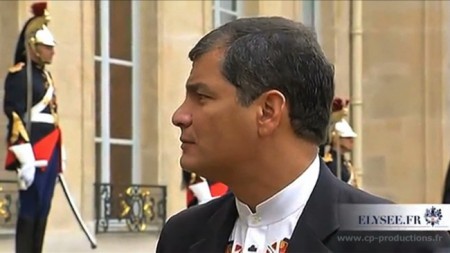
RAFAEL CORREA IN ON REVIENT DE LOIN
Tracking Rafael Correa, his followers and opposition
The full title of this French film, mostly shot in Ecuador, is On revient de loin: Opération Correa 2. It's the on-the-scene follow-up to the 2014 film Les ânes ont soif : Opération Correa 1/The donkeys are Thirsty: Operation Correa 1, in which the French documentary team covered Rafael Correa's tour of Europe and appearance at the Sorbonne, which, as they pointed out with annoyance, was studiously ignored by the mainstream French press including Le Monde diplomatique.
President of Ecuador since 2007, Correa is perhaps the most successful of the new leftist "pink tide" Latin American leaders who included Cristina Kirchner of Argentina, Hugo Chavez of Venezuela, Lula da Silva of Brazil, Evo Morales of Bolivia and himself, starting early in the millennium and giving way lately to a right wing backlash. Rejecting past West-dominated neoliberal policies, anti-austerity in economics, refusing to pay part of the public debt, reclaiming native resources from the multinationals, achieving clear improvements in health care, education, housing, and personal income, Correa has maintained high approval ratings in the country and abroad - though his populist brand of socialism not unlike that of the late Hugo Chavez of Venezuela, has not endeared him to the US.
Thanks to Correa's policy of redistribution, poverty and inequality have been sharply reduced while the middle class has doubled in size in eight years. Pierre Carles and Nina Faure and their team arrived fired up with enthusiasm in this new Eldorado, but encountered unrest and discord in the streets surrounding issues such as legalizing abortion, outlawing gas stoves in favor of induction ones, resettling indigenous people for a mining project, and instituting heavy taxation of the richest citizens - to which they listen with a sympathetic ear. On revient de loin , which is consciously self-reflective, studiously avoids hagiography and continually holds up ideas to be examined and criticized. The French review Télérama calls this a "dialectical" documentary. Libération says in its review the filmmakers "are forced to tone down their enthusiasm." The film not only closely follows views of some opponents of Correa but dramatizes the two directors' differences of point of view and sensibility. They also wind up with different conclusions, one ready to encourage Correa, who speaks French, to come to France and help run the country, the other coming to question the whole idea of a head of state who's some kind of "savior."
One can contrast this documentary, which has good access both to Correa and some of his strongest critics, both on the streets and in offices, with the drum-beating one for Hugo Chavez done by the Irish filmmakers Kim Bartley and Donnacha O'Briain, The Revolution Will Not Be Televised (2003), which I bought into a bit too enthusiastically at the time. Chavez is gone and Venezuela is in a terrible mess.
Carles and Faure, who include several direct interviews with Correa, present a less glowing overall picture. They also don't have a blatant effort by enemies to overthrow Correa to cover, which understandably may have turned the Irish filmmakers into more Chavistas than they were already.
This film points out that you can't remake Ecuador's economy overnight; that Correa's redistributions have not fundamentally changed the system. The film, which has regular Skype dialogues between the team in country and directors back home, has a rough quality, the more so with unexpected demonstrations and hastily organized trips. The provisional feel is at least partly intentional as the jury is still out, and the film, and the regime, are works in progress. The downside is that by film's end, one has heard many arguments, but has little idea how things stand.
On revient de loin: operation Correa 2/Back from Afar: Operation Correa 2, in Spanish with French subtitles and in French, debuted 26 Oct. 2016 in France. Reviewed very favorably by 7 major journals (AlloCiné 3.8). Screened for this review at Espace Saint Michel, Pairs, 26 Oct.
Last edited by Chris Knipp; 10-28-2016 at 04:59 PM.
-
ALEJANDRO JODOROWSKY: POESÍA SIN FIN (2016)
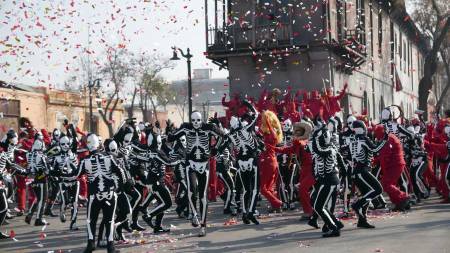
More surreal autobiography from Jodorowsky
Poesia sin fin ("Endless Poetry") is a direct continuation of Jodorowsky's surprising return to filmmaking of three years ago, La danza de la realidad. There are new and astonishing scenes and episodes, some as shocking and disturbing as the last, and the omnipresent stagehands covered in black augment the boldly fantastic mise-en-scène, but if you've seen La danza de la realidad you will feel strangely at home, because there are the same locales and main actors playing the main roles. Again Jodorowsky himself is present as a character and a commentator, handsome, dashing, and entering the second half of his eighties. Again we see the young Alejandro (Jeremias Herskovits as a child; Alejandro's son Adan Jodorowsky grown up) struggling with his domineering, petty-minded father Jaime (played by another older son, Brontis Jodorowsky). Now he is entering into youth and young manhood, and declaring - and living - his enduring passion for and dedication to poetry and poets. That is clear. Specific episodes are surreal and fantastic, and no particular effort is made to recount the actual details of Jodorowsky's early involvement with Latin American and European intellectual circles. Just go with the flow, and you'll be taken to new places.
Poesia sin fin, 128 mins., debuted at Directors Fortnight at Cannes May 2016; over a dozen other international festivals including Moscow, Munich, Jerusalem, Locarno and Vancouver. Theatrical release in France 5 Oct. The (AlloCiné press rating is a glowing 4.0/23, and Anglophone critics have been equally enthusiastic: Metacritic 84%.) Screened for this review at MK2 Odéon - (côté St-Michel), Paris,on 23 Oct. 2016.
Last edited by Chris Knipp; 10-29-2016 at 07:03 AM.
-
CLAUDE BARRAS: MA VIE DE COURGETTE/MY LIFE AS A COURGETTE (2016)
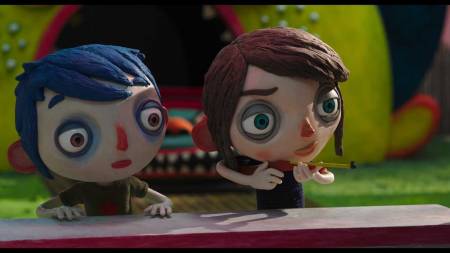
COURGETTE AND CAMILLE IN MA VIE DE COURGETTE
Tough kids
This stop-motion animated film from the Swiss director Claude Barras is about little kids, but is it for little kids? Its treatment of a group in a foster care center who've encountered hard knocks early on could build sensitivity among youngsters, but their parents might not want them to see it. It delivers a parallel and engaging message. Just as we the viewers surprise ourselves by how fond we grow of young critters who look like big-eyed rag dolls, the kids they represent, with little to go on in previous knowledge or experience of love, develop deep loyalty and affection toward each other in the film's short but emotionally intense 70-minute run time.. All this is thanks to Barras' fortunate collaboration on the writing with the 36-year-old Céline Sciamma, whose three films thus far as a writer-director, Water Lilies/Naissance des pieuvres (2007), Tomboy (2011), and Girlhood/Bande de filles (2014) has each in its different way shown a fresh, bold way of looking at the experience of youth. (Sciamma's contribution as a writer has just been seen in André Téchiné's strong new gay coming-of-ager, Being 17/Quand on a 17 ans.) Here she is adapting a novel by Gilles Paris.
Icare (Icarus, voiced by Gaspard Schlatter) is a 9-year-old who prefers his nickname "Courgette" (aubergine, zucchini). He lives with his alcoholic sigle mother, until he causes her accidental death, and he is taken by a kindly, mustachioed policeman called Raymond (Michel Vuillermoz), to the orphanage. We feel keenly the loneliness and strangeness of the first hours there, the first, sleepless, night. He is mercilessly teased by others, led by Simon (Paulin Jaccoud). Simon's rag-doll face is the most interesting. Its sharp angularity seems cruel, and then reflects vulnerability. It soon becomes clear the kids share very similar experiences of deadbeat, druggie, alcoholic and absent parents.
Barras and Sciamma don't make the foster center a harsh place. Just being there is hard enough for these lost children. Every minute there, and on a brief trip to the mountains, is a time of intense learning and change for the kids. Simon razzes Courgette and insists on calling him "Potato." When the moment comes that he uses "Courgette," it's a big coming together. Then comes the arrival of Camille, whom Courgette falls for. Again the bonding owes a lot to sharing similar, grim backgrounds. Things get more complicated when an evil aunt wants to adopt Camille, and the sweet Raymond first visits, then wants to adopt, the children.
As Boyd van Hoeij says in his Cannes review for [URLf="http://www.hollywoodreporter.com/review/my-life-as-a-courgette-891734"] Variety[/URL], given that the kids' "faces are made of plasticine, what Barras has achieved here is nothing short of a miracle." There is nothing like the complicated mise-en-scène of the Belgian stop-motion Panique au villageof Stéphane Aubier and Vincent Patar, but somehow we're immediately drawn in emotionally and it stays that way. It's almost as if the more blatantly unreal the scenes and critters are, how simple and minimal the settings, the more we identify and care. Some of the vivid, delicately particularized experience depicted here is sure to stay with you.
Ma vie de courgette/My LIfe As a Courgette, 66 mins., debuted 15 May 2016 in Directors Fortnight at Cannes; close to a dozen other festivals including Annecy and Angoulême. French theatrical release 19 Oct.: rave reviews (AlloCiné press rating 4.5 based on 30 critiques). Screened for this review at MK2 Odéon Hautefeuille 28 Oct. 2016. There were some little kids brought to the early show; I wondered how it went for them. Probably fine. They're tougher than we know; that's what the film itself is telling us. And as van Hoeij points out this is ultimately a happy movie that ends with sunshine.
Last edited by Chris Knipp; 01-02-2017 at 09:03 AM.
-
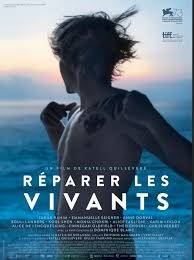
Coming next week in Paris.
Two films coming to Paris cinemas in a couple days look like must-sees: Katell Quilleveré's Réparer les vivants/Heal the Living and Park Chan-wook's Mademoiselle/The Handmaiden. Both have been widely publicized.
Réparer les vivants , which debuted recently at Venice, is a double narrative about the death of a young surfer and the patient who's going to receive his heart in a transplant operation; it's adapted from a novel by Maylis de Kerangal.
The Handmaiden, which was in Competition at Cannes, is a swoony, stylized and gorgeous-looking potboiler (an "erotic psychological thriller," they are calling it) that is a bit of a change for the director of Oldboy and the Vengeance series.
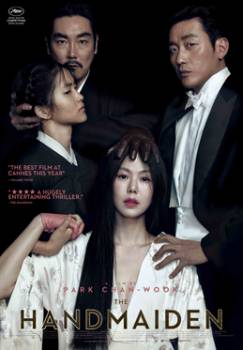
Last edited by Chris Knipp; 10-30-2016 at 06:26 AM.
-
RÉPARER LES VIVANTS/HEAL THE LIVING (Katell Quillévéré 2016)
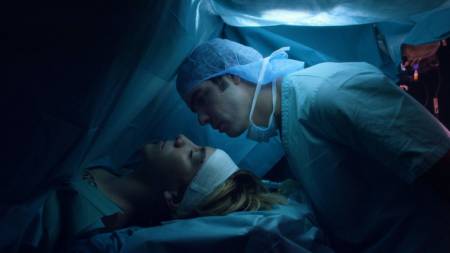
GABIN VERDET AND TAHAR RAHIM IN RÉPARER LES VIVANTS
It all comes together
Katell Quillévéré's third feature adapts Maylis de Kerangal’s bestselling French novel (Heal the Living), a humanistic medical thriller about events leading up to a heart transplant. It begins with Simon (Gabin Verdet), the bleach-blond surfer boy whose car accident makes him brain dead and his perfect organs available for replacing others' failing ones, if his devastated parents, Marianne and Vincent (Emmanuelle Seigner and Kool Shen) are willing. Meanwhile there are closeups of the medical professionals involved, young cardiologist Thomas Rémige (Tahar Rahim) and his master Docteur Pierre Révol (Bouli Lanners) and nurse Jeanne (Monia Chokri). Then we observe Claire (Anne Dorval of Xavier Dolan's Mommy), the lady who is to receive Simon's heart, a lesbian classical pianist and motehr of two college-age sons (Finnegan Oldfield, Théo Cholbi) whose heart's days are numbered.
Like Tell No One, a French version of an American crime story way better than Hollywood could do it, this is a ridiculously vivid, clear, humanistic and tasteful version of what seems the most conventional US TV medical drama material, and you cannot but admire it, while in the back of your mind still wondering, why did she bother? Quillévéré's leap forward as a director of complex, demanding movie dramas - with more budget and more name cast members - is also a step back out of the raw indie territory she inhabited in her first two movies into a safer, more mainstream, even if demanding, work.
But it's still an ambitious, complex film, and not only does she never slip into the saccharine territory that the material threatens to draw her into, but she provides some lovely touches, while the whole fits together impeccably.. The opening passage when Simon leaves his girlfriend Juliette (Galatea Bellugi) in the wee hours, leaping out the window, races a pal, suits up and surfs - water sequence magnificently shot to show both perfect marriage with the waves and threat of death. Then the fatal drive, turned into a sea death as sleepiness of all three youths makes the road and horizon fade into soft waves, the crash just a bang, no messiness. This whole Simon passage, a model of its kind, is of a sublime simplicity and physicality, delivering nothing but a sense of youth, health, and impermanence. The only further development of Simon is equally physical: to seduce Juliette at first meeting, he successfully races her rail car with his bike, leaps over his bike in a move I've never seen, climbs up breathless to the platform, and they kiss.
Later, the film gets equally intimate in a lower key in following Claire as she interacts with her concerned sons Maxime (Oldfield) and Sam (Cholbi) and attends a piano concert by her beautiful protégée and former lover Anne Guérande (actress and pianist Alice Taglioni). She also meets with her cardiologist, who will perform the translpant; Drs. Rémige and Rémol will remove Simon's heart. Claire's scenes require a refocusing effort from the audince after the intensity of the earlier passages, all of them at a high pitch further heightened by Alexandre Desplat's piano-based score. The presence of the well-known French movie composer is a sign of the glossier production, but Thomas Marchand, the editor, whose presence is more essential, was present on the director's first two films. Claire's sequences apparently add to a barely outlined character in the novel, and they're still relatively flat after the vivacity and invention of Simon's sequences and the high pitched emotions of his parents' grieving. A turning point in the film, and a key to its humanism, comes when Marianne and Vincent, still in great grief, come to accept the goodness of allowing their son to be an organ donor.
The still boyish Rahim, who gently elicits this decision, is a good choice for exuding human kindness, and the film's best moment and best evocation of the magic of the medical miracle this story is about comes when he carries out a ritual farewell to Simon in the operating room following the boy's parent's directives, and it's at this moment that this tasteful and economical film indulges in its one repeat sequence, Juliette's tearful face in the light of dawn and Simon's leap out her window: rhythmical repetition, a joining of the circle, death and life.
Still, for all this beauty, though may not miss the oddness of the director's debut Love Like Poison, one does miss a bit the wildness and emotional extremity of her sophomore effort, Suzanne, which also put Adèle Hanel on the map. What Réparer les vivants, heavily publicized in France and widely distributed there, does do, is show that Quillévéré is a directorial talent both recognized and worth continuing to follow.
Réparer les vivants/Heal the LIving, 105 mins., debuted at Venice Sept. 2016, also showing at Toronto and London. French theatrical release bega 1 Nov. 2016. Screened for this review at UGC Danton, Paris, 1 Nov. 2016.
Last edited by Chris Knipp; 02-17-2017 at 02:17 PM.
 Posting Permissions
Posting Permissions
- You may not post new threads
- You may not post replies
- You may not post attachments
- You may not edit your posts
-
Forum Rules





 Reply With Quote
Reply With Quote







Bookmarks